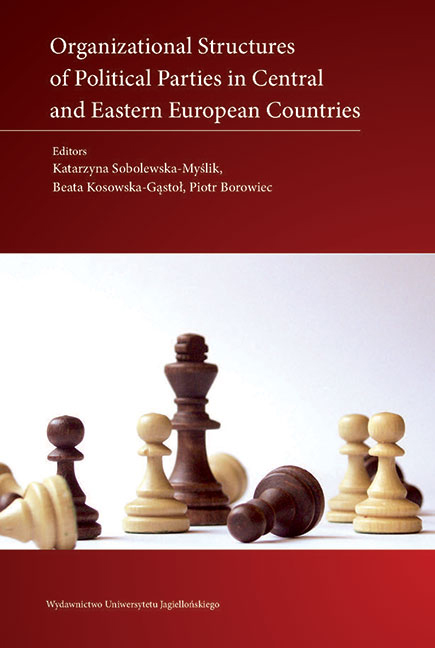Book contents
- Frontmatter
- Contents
- Preface
- Developing Party Structures in Central and Eastern Europe
- Albania: Organizations of Political Parties in Albania
- Belarus: Belarusian Political Parties: Organizational Structures and Practices
- Bosnia and Herzegovina: Organizational Structures of Political Parties in CEE Countries: A Case Study on Bosnia and Herzegovina
- Bulgaria: Organizational Structure and Trends in Bulgarian Party Politics
- Croatia: Organizational Structures of Political Parties in Croatia
- Czech Republic: Between Organizational Extremes: Czech Parties after a Political Earthquake
- Estonia: Organizational Structures of Political Parties in Estonia
- Hungary: Cut from the Same Cloth? A Comparative Analysis of Party Organizations in Hungary
- Kosovo: Structure of the Main Political Parties in Kosovo
- Latvia: Leader-Centered and Power-Hungry: Party Organizations in Latvia
- Lithuania: Organization of Political Parties: The Case of Lithuania
- Moldova: Organizational Structures of Political Parties in The Republic of Moldova
- Montenegro: Party Organization in Montenegro: Structural Resemblance Behind Political Divergence
- Poland: Structures of Polish Political Parties in the Second Decade of the 21st Century
- Romania: The Internal Organization of Romanian Political Parties
- Russia: Parties with Roots Growing Upwards: Organizational Features of Russian Political Parties
- Serbia: Organizational Structures of Political Parties in Serbia
- Slovakia: Organizational Structures of Political Parties in Slovakia: Parties not for Members
- Slovenia: Almost without Any Innovations: Organizational Structures in Slovenian Parties
- Ukraine: Shallow Party Structures in a Volatile Party System
- Comparing Organizational Structures of Political Parties in Central and Eastern European Countries
- Biographical notes about the authors
Ukraine: Shallow Party Structures in a Volatile Party System
- Frontmatter
- Contents
- Preface
- Developing Party Structures in Central and Eastern Europe
- Albania: Organizations of Political Parties in Albania
- Belarus: Belarusian Political Parties: Organizational Structures and Practices
- Bosnia and Herzegovina: Organizational Structures of Political Parties in CEE Countries: A Case Study on Bosnia and Herzegovina
- Bulgaria: Organizational Structure and Trends in Bulgarian Party Politics
- Croatia: Organizational Structures of Political Parties in Croatia
- Czech Republic: Between Organizational Extremes: Czech Parties after a Political Earthquake
- Estonia: Organizational Structures of Political Parties in Estonia
- Hungary: Cut from the Same Cloth? A Comparative Analysis of Party Organizations in Hungary
- Kosovo: Structure of the Main Political Parties in Kosovo
- Latvia: Leader-Centered and Power-Hungry: Party Organizations in Latvia
- Lithuania: Organization of Political Parties: The Case of Lithuania
- Moldova: Organizational Structures of Political Parties in The Republic of Moldova
- Montenegro: Party Organization in Montenegro: Structural Resemblance Behind Political Divergence
- Poland: Structures of Polish Political Parties in the Second Decade of the 21st Century
- Romania: The Internal Organization of Romanian Political Parties
- Russia: Parties with Roots Growing Upwards: Organizational Features of Russian Political Parties
- Serbia: Organizational Structures of Political Parties in Serbia
- Slovakia: Organizational Structures of Political Parties in Slovakia: Parties not for Members
- Slovenia: Almost without Any Innovations: Organizational Structures in Slovenian Parties
- Ukraine: Shallow Party Structures in a Volatile Party System
- Comparing Organizational Structures of Political Parties in Central and Eastern European Countries
- Biographical notes about the authors
Summary
Introduction
While it may be common knowledge that viable democracy is impossible without strong political parties, developments in recent decades point to a significant decrease in their importance for both citizens and decision makers. This opinion is shared by many scholars of parties and party systems and is corroborated by numerous trends observed in countries, where parties were once the vanguards of democratic development, i.e. in Western Europe and North America. Firstly, a considerable drop in membership numbers and a lesser degree of voter identification with parties have been observed since the 1990s (Ignazi 1996: 550). Secondly, parties for quite some time have become increasingly less important in promoting their members to key public offices and influencing domestic decision-making processes. Instead, these capacities are gradually being taken over by executive officials and other non-party experts.
Needless to say, the above trends are general, and the development of parties varies from country to country. In many post-communist countries of Central and Eastern Europe (CEE), parties had no “golden age,” like their Western counterparts did. Instead, they were formed under different socio-political conditions which put serious constraints on their ability to become influential actors within their own political systems. Moreover, parties in these countries oft en did not fit the functional model applied to those in established democracies. Consequently, scholars had to discover anew the roles played by parties in post-communist countries.
Clearly, the different conditions under which parties in CEE countries were established have in large measure determined their internal organization and external operation. Th is chapter will analyze and compare peculiarities of the organizational structures of key Ukrainian parties. Since the organizational features of modern Ukrainian parties are strongly influenced by past experience in party building, our analysis would be incomplete without at least a brief overview of party development in Ukraine since the country became independent. This topic will be covered in the first subchapter, followed by a short outline of recent developments in the Ukrainian party system. Next, we will analyze the main structural features of the primary Ukrainian parties. Attention will be given to legal provisions regulating party activity, party membership, internal party structures, and the role of party leadership. Finally, we will end our analysis with several concluding remarks.
- Type
- Chapter
- Information
- Organizational Structures of Political Parties in Central and Eastern European Countries , pp. 441 - 464Publisher: Jagiellonian University PressPrint publication year: 2017



